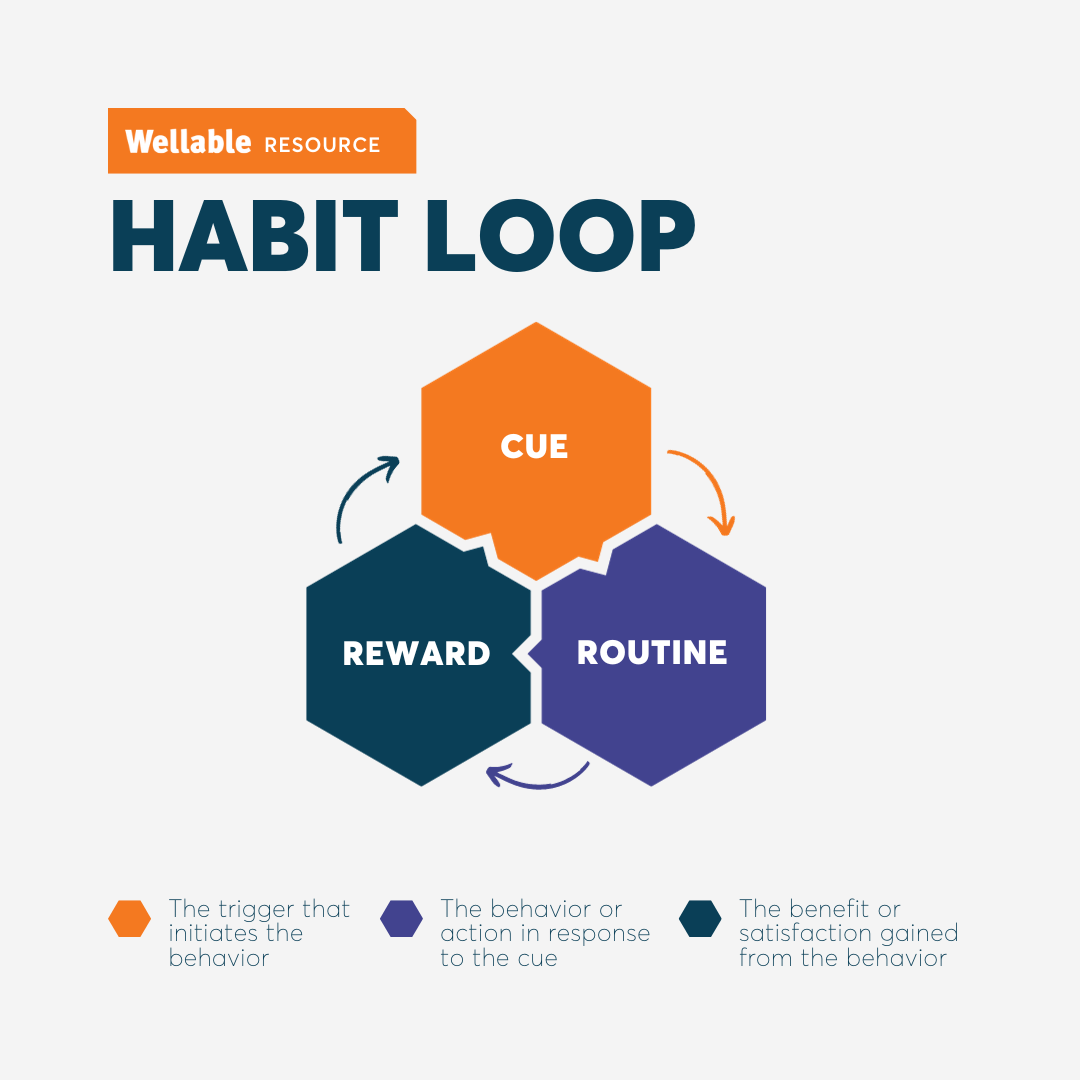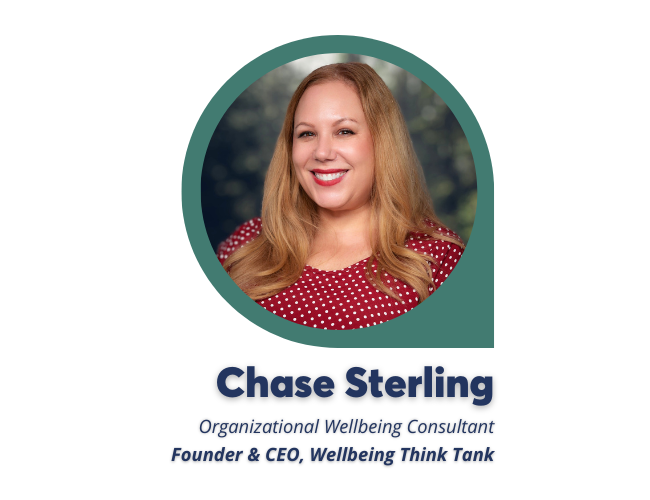As the calendar turns to a new year, countless individuals become motivated to make changes and improve themselves. However, despite the best intentions to commit to new personal and professional goals, the average New Year’s resolution is abandoned within three to four months.

This gap between intention and achievement highlights the importance of understanding and forming effective habits in both personal and professional life.
In the workplace, employers play a crucial role in fostering a work culture conducive to healthy habit formation. By understanding the mechanics of how habits are formed, organizations can better support their employees in turning resolutions into realities, improving overall workplace well-being and productivity.
Pressed for time? Here’s a quick summary…
- ‘Habit loops’: Habits are formed through ‘habit loops’, which involve a cue (the trigger that initiates the behavior), routine (the behavior in response to the cue), and reward (the benefit from the behavior that reinforces the habit loop).
- Goal setting and consistency: To aid employees in habit formation, encourage them to develop realistic, incremental goals. Strategies like scheduling reminders and habit stacking (linking a new habit to an existing one) can set them up for success.
- Supportive work environment: Provide nutritious snacks and wellness rooms in the office to support the creation of healthy habits. Promote a growth mindset among employees and encourage them to share their goals, successes, and setbacks, fostering accountability and resilience.
- Benefits for employers: Supporting habit formation in the workplace improves employee well-being, increases engagement and retention, and improves overall work ethic and performance.
Science Of Habit Formation: ‘Habit Loop’
Neurologically, habits are more than just repeated actions; they are deeply ingrained behaviors that, over time, can become automatic. This allows people to perform actions, from driving to typing, without conscious thought.
In the context of habit formation, repeated actions become embedded in the brain’s neural pathways, facilitating the development of healthy habits over time. This same wiring makes breaking undesirable habits challenging.
The habit formation process is often described as a ‘habit loop’, which involves three components:
- Cue: The trigger that initiates the behavior (e.g., an alarm sound that cues someone to start their morning routine)
- Routine: The behavior or action in response to the cue (e.g., in response to the alarm, the routine might involve exercise or meditation)
- Reward: The benefit or satisfaction gained from the behavior, which reinforces the habit loop (e.g., the endorphin rush after a workout or the calmness following meditation)

Understanding and manipulating these components can lead to successful habit formation or alteration.
21-Day Habit Formation Myth
The “21-day rule” for habit formation is a widespread belief suggesting that it takes precisely 21 days to establish a new habit. Despite its popularity in self-help literature and motivational talks, this concept oversimplifies the complex nature of habit formation.

Research shows that the speed of habit formation is correlated with the complexity of the habit. Simple habits like drinking a glass of water every morning, handwashing, or flossing can develop in one to two weeks. However, more intricate behaviors like maintaining a gym routine and dietary changes may take months of sustained effort to solidify.
Individual differences also play a role, with motivation, self-discipline, and past experiences affecting the pace of habit formation.
While the “21-day rule” serves as motivation, it’s crucial to recognize habit formation’s complexity by encouraging realistic goals and acknowledging individual differences in the process.
Employer Strategies For Supporting Employee Habit Formation
Habit formation isn’t just about deciding to change; it requires setting up the process for success. Employers and HR professionals can apply several strategies to support the development of effective and sustainable habits.

Set Realistic & Achievable Goals
When working toward larger goals, incremental changes often lead to more sustainable behaviors. For instance, instead of aiming to overhaul a diet overnight, encourage employees to incorporate fruits or vegetables daily. These small victories not only increase confidence but also lay a solid foundation for more significant changes.
Consistency Is Key
Regular repetition of a behavior reinforces the ‘habit loop’. To help employees maintain consistency, encourage them to:

- Schedule it: The new habit should be a non-negotiable part of employees’ daily schedules.
- Implement reminder systems: Suggest using alarms or notifications as cues to perform the new habit.
- Habit stack: This involves linking the new habit to an existing one. For example, if an employee already drinks coffee every morning, that habit can be stacked with taking supplements at the same time.
Role Of Environment
To create an environment conducive to successful habit formation, consider the following:

- Well-organized space: A clutter-free workspace can promote productivity habits, while a distracting environment may hinder them.
- Wellness-oriented office amenities: Provide nutritious snacks and wellness rooms in the office to support healthy habits.
- Cultivate a supportive culture: Encourage employees to share their goals, successes, and setbacks with each other and with their manager, creating accountability and mutual support.
Common Pitfalls & Staying On Track

In the pursuit of new habits, employees may encounter challenges that can derail their progress. Identifying these obstacles is the first step towards overcoming them. Common challenges and strategies to help employees stay on track include:
- Time constraints: In a busy workday, carving out time for new habits can be challenging. Encourage employees to allocate specific time slots for habit-building activities.
- Lack of motivation: Initial enthusiasm can wane over time. Suggest techniques such as setting rewards or finding an accountability partner to maintain motivation.
- Negative self-talk: Self-doubt and negative thoughts can impede progress. Promote self-compassion and emphasize the importance of small victories.
- Stress and burnout: High levels of stress can hinder habit formation. Introduce stress management techniques and promote rest to counter this.
Despite best efforts, certain habits may not be suitable or sustainable in the long term. Remind employees that it’s okay to adjust or pivot when necessary. The ability to modify habits based on changing circumstances paves the way for lasting lifestyle changes.
Benefits Of Habit Formation In The Workplace

Supporting habit formation in the workplace yields significant, long-term advantages for employers. Recognizing these advantages can shape effective wellness initiatives and inspire ongoing efforts.
- Employee well-being: When employees adopt and maintain healthy habits, they experience improved physical and mental health.
- Resilience: The process of habit formation involves challenges and setbacks, fostering resilience that can be applied to work tasks and projects.
- Productivity and work ethic: Habits that promote time management, organization, and focus translate to improved work ethic. Practicing consistency and prioritization can help in efficiently achieving work-related goals.
- Confidence: Achieving personal goals boosts employees’ confidence, extending to work tasks.
- Employee engagement and retention: Supporting habit formation demonstrates a commitment to employees’ personal development and work-life balance, boosting engagement and retention.
Mindset Matters
Encourage employees to adopt a growth mindset, viewing habit formation as a personal development journey rather than a chore. Viewing challenges as opportunities, celebrating small victories, and learning from setbacks fosters a resilient and adaptive attitude towards habit formation.
Check out Wellable’s challenge templates that kickstart and support employees’ new year goals!


















